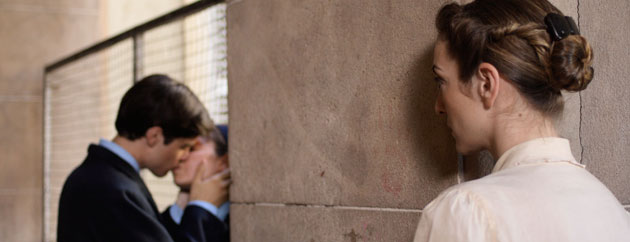
The Invisible Eye
08 March, 2012Based on the book Ciencias Morales by Martin Kohan, The Invisible Eye (La Mirada Invisible) is a film about discipline and the stranger sides of sexuality, all set against the allegorical backdrop of a strict private school during the dying days of the Argentine military dictatorship.
Maria (Julieta Zylberberg) is the latest recruit to the classroom assistant team, and the film opens with her at the head of a column of children who march, Madeline-like, down a creaky dingy corridor. Like many of the other scenes in the film, this has an overtly military overtone, and in spite of the social changes against the regime which might be happening outside, the authorities of this school are eager to maintain power in this closed community.
The head of classroom assistants, Snr Biasutto (Osmar Nuñez) takes a shine to Maria, and spends time explaining to her, outside of hours, about the best methods of keeping the pupils in check:
“What is the secret to good discipline?”
“Surveillance?”
“Yes, continuous surveillance.”
If this sounds a little over-zealous, he later starts to get even more carried away with talk about how to tackle the “cancer of subversion” and occasionally, both the viewers and Maria are left wondering if he is still talking about the school at all:
“What happens when you win a war is the eradication of the pockets of resistance which are left.”
Although denied permission to film there, the school is the prestigious Colegio Nacional de Buenos Aires which was founded by former president, Bartolomé Mitre, and attended by many notable Argentine statesmen including Manuel Belgrano, leader in the war of independence and creator of the Argentinian flag. Both the new influx of pupils and we, the viewers, are assured that:
“The history of the school and the history of the country go hand in hand.”
And so we are then entitled to interpret the happenings in the school as symbols of the greater political narrative. Though I don’t think the film needs to be seen in this way. Maria’s perverted sexual awakening is a story in itself and the director, Diego Lerman, only allows the outside events to fully intrude during the credits when real footage is shown from a nationalist rally about the Falklands/Malvinas conflict.
One really clever and unique device is that the director plays tricks on us with smells. At first we think that the eager Maria is leaning in to detect cigarette smoke in the boys’ hair. This changes when we see her buying aftershave to secretly sniff in her bedroom. The scenes where Maria lingers spying in a boy’s toilet cubicle become weirder and weirder. We can almost smell the damp, amongst other more pungent things, and become more and more unsettled, disgusted and confused by her behaviour.
What the film does especially well is probe dark and uncomfortable moral areas in a similar vein to the work of Pablo Larraín and Michael Haneke (specifically Post Mortem and The Piano Teacher respectively). Their films have little dialogue and rely on the viewer to do much of the work. Quirky events turn more and more sinister until a horrifically brutal ending forces you to think back over the story to find the character’s motivation.
However, you don’t always feel that the scale of the graphic scenes in these films is justified, and sometimes you wonder if they are pointlessly extreme or just plain gratuitous. But perhaps suspension of at least some disbelief is needed with all stories, especially the dark and creepy ones, to stop us from being genuinely disgusted or outright offended.
Maria’s problem was probably a kind of naivety. Perhaps she was a little over-mothered by the two generations of women she lived with:
“Grandma, have you ever been in love?”
“Of course I have. Do you think I’m a plant?”
Or maybe she was deeply affected by the absence of her father. Someone who the family simply don’t talk about. It is left open as to why, and could equally be a family problem, or taking the film as an allegory, a political one.
Diego Lerman is best known for his comedy Tan de Repente (Suddenly), a road movie about female sexual awakening, and although that particular theme is present, the style and tone could not be more different. The Invisible Eye manages to skilfully disturb more senses than your usual high school movie ever could.
The Invisible Eye is showing as part of ¡Viva! festival 2012 at Cornerhouse, Machester. See cornerhouse.org/viva2011 for screenings.
Follow Sounds and Colours: Facebook / Twitter / Instagram / Mixcloud / Soundcloud / Bandcamp
Subscribe to the Sounds and Colours Newsletter for regular updates, news and competitions bringing the best of Latin American culture direct to your Inbox.

